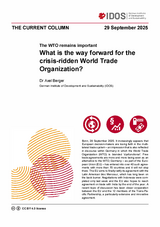The WTO remains important
What is the way forward for the crisis-ridden World Trade Organization?
Berger, AxelThe Current Column (2025)
Bonn: German Institute of Development and Sustainability (IDOS), The Current Column of 29 September 2025
Bonn, 29 September 2025. It increasingly appears that European decision-makers are losing faith in the multilateral trade system – an impression that is also reflected in discourse within Germany in which the World Trade Organization (WTO) is branded ‘dysfunctional’. Free trade agreements are more and more being seen as an alternative to the WTO; Germany – as part of the European Union (EU) – has entered into over 40 such agreements with more than 70 countries and it will not stop there. The EU aims to finally ratify its agreement with the Latin American bloc Mercosur, which has long been on the back burner. Negotiations with Indonesia were completed only last week and the EU also hopes to reach agreement on trade with India by the end of the year. A recent topic of discussion has been closer cooperation between the EU and the 12 members of the Trans-Pacific Partnership, a particularly extensive and innovative agreement.
So are there indeed simpler, more pragmatic ways of facilitating rules-based trade outside the crisis-hit WTO?
Unfortunately, it is often overlooked that just as free trade agreements are overestimated, the role of the WTO is underestimated in many cases. The main argument against free trade agreements is taken from Italian cuisine: the trade economist Jagdish Bhagwati once compared free trade agreements with a spaghetti bowl, criticising the lack of coherence and clarity of numerous bilateral agreements. Free trade agreements do in fact create a confusing set of interwoven tariffs and rules, entailing costs and bureaucracy through which the contracting parties attempt to exclude other countries from the trade advantages. This reduces the efficiency gains associated with low tariffs. Small and medium-sized enterprises without well-resourced customs departments in particular therefore often prefer to fall back on the multilateral tariffs agreed within the framework of the WTO, which are higher in most cases but easier to implement. It also often takes years before the increasingly complex free trade agreements are negotiated and ratified. Moreover, no agreement is in sight with the two other trading superpowers, China and the United States. Free trade agreements should thus be seen as an option for supplementing the WTO, not replacing it.
The WTO is certainly undergoing a crisis, but that does not mean that it is dysfunctional. While the dispute settlement mechanism, which used to be referred to as the WTO’s ‘crown jewel’, has been weakened due to the United States blocking the Appellate Body, new disputes are constantly being submitted. Discussions within the WTO’s technical committees lead to many misunderstandings being resolved before they turn into disputes. The WTO also continues to play an important role in monitoring the trade policies of its members, thus ensuring system-wide transparency. All these WTO functions can and must be further developed, but they cannot be replaced by a network of free trade agreements that do not provide these systemic services.
Overshadowed by the debate about the supposed stagnation within the WTO, progress often goes unnoticed. One of the WTO’s key functions is to negotiate new trade rules. The WTO’s negotiation engine is sputtering and running too slowly, but it has not stalled completely. Only a few days ago, the Agreement on Fisheries Subsidies came into force. This agreement may have come late – more than 20 years after the start of negotiations – but it nevertheless has the potential to help prevent global overfishing. An agreement to simplify trade in services was also adopted recently and an agreement on investment facilitation is ready to be negotiated. These two ‘plurilateral agreements’ in particular highlight how, specifically faced with the obstructionist stance adopted by a few of its members, the WTO rules can be further developed in future: through thematic cooperation in alliances with like-minded members.
The WTO Agreement on Investment Facilitation for Development can show the way forward here: it is an agreement primarily initiated and negotiated by low- and middle-income economies (127 of the 166 WTO member countries are signatories). The agreement contains a flexible set of rules and a comprehensive development dimension. It has the potential to increase global prosperity, including for non-members. Countries such as India and South Africa continue to block incorporation of the agreement into the WTO rules. Nonetheless, members have already begun to carry out the agreement by preparing for implementation of the rules it contains because they are convinced that, by doing so, they can provide a reliable framework for foreign direct investments. Germany and the EU should increase their support for this implementation process – in the interest not only of the partner countries but also of their own companies investing abroad.
The WTO should not be turned into a problem unnecessarily. Germany and the EU are reliant on it, particularly in view of the need to reduce the economic risks in trade relations with China and the United States. It continues to be the central platform for establishing thematic partnerships with the majority of the world’s economies in order to promote a cooperative and rules-based system of world trade.


